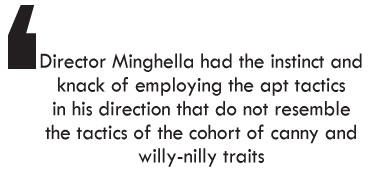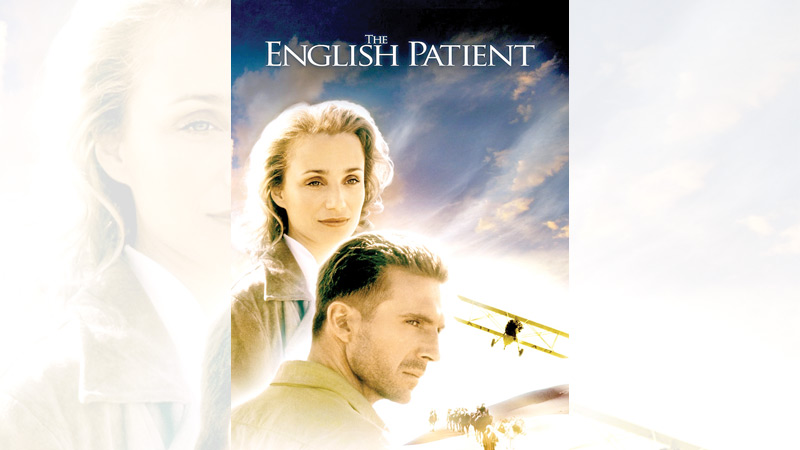Being the recipient of nine Academy Awards, six BAFTA Awards and countless number of other Awards, “The English Patient” becomes an exception in the domain of the film industry.
The film is based on the 1992 novel “The English Patient” by Sri Lanka-born Michael Ondaatje who won The Booker Prize and the Golden Booker in 1992 and 2018 respectively.
Produced by Saul Zaentz and directed by Anthony Minghella, “The English Patient” makes a man who is utterly burned, its protagonist. The burned man starts speaking with an English accent. In retrospect, he recalls his memory of his love affair that he had prior to the war.
If you doubt the ability of a film in depicting the essence of love, pain, and agony, Minghella is the metaphor that is able to erase your doubt with his “English Patient”, being the capsule that cures the disease of indecision and lack of certainty.
The film beyond any doubt was voted as one of the blatant and brazen tales of love, romance, and passion in recent history; its dialogues that are miraculously quick and quick-witted add an enormous degree of glamour and confidence into its characters which give an assurance on its unblemished and unmatched performances. The film arguably reaches a considerable level of eros and ardour which a significant number of films of such calibre do not possess.
Critics may argue that “The English Patient” is hammy and stagy. That argument is not baseless.
The film has smartly managed to attract the viewer into the script that gives it an identity of a superlatively sharpened and perfected melodrama.
 Director Minghella had the instinct and knack of employing the apt tactics in his direction that do not resemble the tactics of the cohort of canny and willy-nilly traits.
Director Minghella had the instinct and knack of employing the apt tactics in his direction that do not resemble the tactics of the cohort of canny and willy-nilly traits.
The love between Almasy, played by Ralph Fiennes, and Katherine, played by Kristin Scott Thomas entails the characteristics of an affinity and saga. The significance that drives into the flow of the film is its structure that is enriched with the exchange of elliptical colloquial dialogues. The opening scene takes you to the time of World War II where a plane owned by the British was shot down in the skies over the North African desert.
The pilot of the shot aircraft is identified as a Hungarian count, Laszlo Almasy. Almasy is awfully and atrociously burned in the attack that crashed his plane. At the end of the war, Hana, played by Juliette Binoche, takes the badly burned and injured flyer Almasy to an Italian monastery.
Hana, a Canadian nurse is also terribly troubled and devastated by the terrifying outcomes brought out by the war. She lost both her lover and best friend; the trauma and agony experienced by Hana is tremendous and the same degree of hard feelings give rise for her to care for Almasy within peace and tranquillity of the countryside.
Beauty lies with the far-flung and expansive locations and landscapes, shown throughout the film.
Similarly, as cited by some critics, the breath of the poignant and spontaneous curve and twist, associated centrally with the two lovers also have the same degree of boldness and audacity.
The film itself is a comprehensive chronicle of war, lost love, and tender passion, narrated with fussiness and fastidiousness. Whilst watching the movie, I thanked myself for not predominantly being literal and unimaginative. Having a vivid and profound emotional intelligence seems to be the key to the movie through the novel.
A subtle delicacy necessitates; the plot as a last resort frequently engages and the cast is imposing with a sense of artistry and prowess, made edible and durable by the choice of categorically distinguished sets. Though far too long, “The English Patient” is irrefutably a moving and reverting movie; a masterpiece that truly deserves its multiple Oscars.
Intriguing is the confidence in storytelling. The viewer is taken elsewhere the camera had been; from the market in the Egyptian capital to the Sahara Desert in Africa and to the clammy and sticky bedroom of the lovers. The reason behind the success of the movie is arguably well founded.
The late Anthony Minghella had done a terrific job in bringing the passionate ill-fated romance lies in the words of Michael Ondaatje to the silver screen.
The film is definitely an atmospheric cinema, at its ever best and a timeless classic that justifies in the fact that a masterpiece never perishes.








